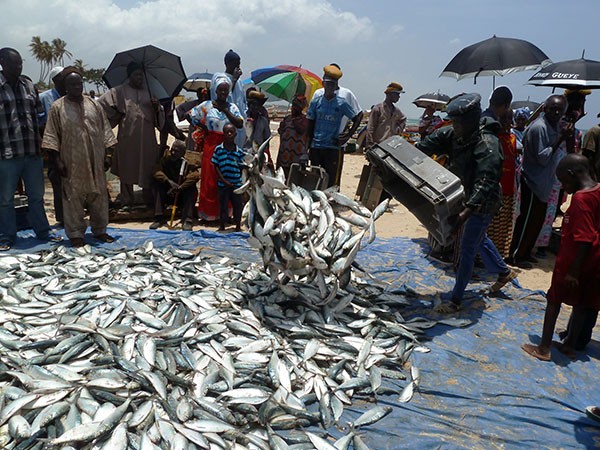
It’s a mosaic of sights and sounds: A group of women in brightly colored dresses sitting in a circle laughing, singing, beating on drums, and clapping. In the middle, two women move to the music, bending down and dancing. These women are fish processors in the coastal city of Cayar, Senegal, and they exchange ideas, improve their livelihoods, and celebrate life through song and dance.
Women Work Together
In 2011, the USAID/COMFISH project started working with these women to pioneer eco-friendly fish processing methods and boost their incomes. The project, which is managed by the Coastal Resources Center at the University of Rhode Island Graduate School of Oceanography, works across Senegal to increase the resiliency of coastal communities to climate change and to build an ecosystem-based management plan for six priority fish species, which provide much of the dietary protein for people in Senegal.
To successfully use an ecosystem approach, local fishers, processors, and the community must all take part in fisheries management to address a range of human and ecosystem needs simultaneously. As part of this process, USAID works with leading women’s fish processing associations to organize into committees with specific responsibilities, such as ensuring hygienic standards for fish processing.
At first, many women fish processors lacked the tools and resources to reach their full potential. So the project set a goal: To establish environmentally sustainable processing sites for them. But this involved attaining land and permits from local authorities, some of whom discriminated against women. Project staff spent a lot of time lobbying stakeholders and explaining the ways women processors could benefit the environment, the economy, and the community. It was an arduous process but it paid off when they obtained land for a new processing unit for women in Cayar.
The site, which is home to fish smoking ovens and a modern 1,500-square meter processing facility, allows the women to work more productively and collaboratively. Over 200 women work there to salt, ferment, dry, and roast the fish. They manually process the fish into different products such as the fermented and dried fish known as gej, the salted and dried fish known as sali, and the roasted and dried fish known as keccax.
Empowerment Through Community
The women are working together to improve their processing methods. With support from USAID/COMFISH, they developed a code of conduct to govern their trade, the first of its kind in the women’s fish processing sector. The code ensures that fish are processed in a hygienic and safe manner that complies with environmental regulations. One section of the code requires that the women not buy or process immature or juvenile fish, a prohibition that contributes to the fishery’s resilience against climate change impacts. These new standards will enable the women to sell the fish products with a recognized label guaranteeing their quality, making them much more lucrative.
But illiteracy made it challenging to ensure all women could understand and adopt the code. To make sure they understand the intricacies of the new processing methods, USAID developed easy-to-understand literacy modules on hygiene, quality, and other topics.
The project also embraced the power of culture, community, rhythm, and melody. Project staff engaged the processors in performing traditional women’s songs and dances in Wolof, the local language, which explained the code. The lyrics address the freshness of the fish, cleaning the work area, and personal hygiene–and dances bring them to life. “I can easily understand and memorize the code of conduct through our local songs and dance,” said Fatou Kiné Diop, a fish processor in Cayar.
The women are now working together to build their business and help each other grow. They gather each month over tea and biscuits to discuss their work and plan initiatives to boost their productivity and earning capacity. USAID/COMFISH helps organize these meetings and put their plans into practice. Among the successful initiatives is a literacy program to enhance livelihood opportunities and to further empower them. “With the literacy program, I am now able to write my name, dial a number on my mobile phone, and, more importantly, hold my accounting in a notebook,” said local fish processor Outé Yade.
As the women gain skills and confidence, they are better equipped to pursue alternative livelihoods, further reducing pressures on the fish and the ecosystem. Khady Sane Diouf, USAID/COMFISH project director, said the project has benefited the entire community. “Fish processing by women in Cayar is a shining example of empowerment, environmental protection, and poverty reduction.”
C. McCarthy







Comment
Make a general inquiry or suggest an improvement.